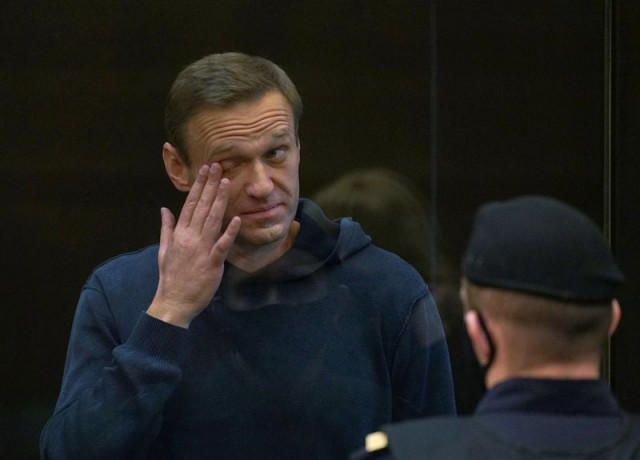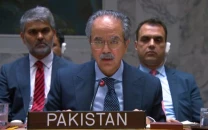Russian court sentences Kremlin critic Alexei Navalny to three and half years in jail
The opposition politician says he was being persecuted due to hatred and fear President Vladimir Putin felt for him

A Russian court sentenced Kremlin critic Alexei Navalny to three and a half years in jail on Tuesday after ruling he had violated the terms of his parole, but said that his prison term would be shortened for time he had served earlier under house arrest.
Navalny’s allies called on their supporters to immediately protest against the ruling in central Moscow.
Navalny’s lawyer said the opposition politician would appeal against the ruling.
A Russian judge on Tuesday retired to consider whether to jail Kremlin critic Alexei Navalny for several years, after the opposition politician said he was being persecuted due to the hatred and fear President Vladimir Putin felt for him.
Navalny, one of Putin’s most prominent critics, was arrested at the Russian border on January 17 for alleged parole violations after returning from Germany where he had been recovering from being poisoned with a military-grade nerve agent.
Navalny said Russian state security agents had put the poison in his underpants, something the Kremlin denied. It has suggested that Navalny is a CIA asset, a charge he rejects, and has told the West to stay out of its domestic affairs.
After his arrest, Navalny released a YouTube video making allegations about Putin’s wealth that was viewed over 100 million times. The Kremlin said it was false.
A serious jail term for Navalny, after two consecutive weekends of nationwide protests calling for his freedom, would strain already poor ties with the West, which would be likely to consider imposing sanctions on Moscow over the case.
On the eve of the hearing, a close Navalny ally urged the West to hit Putin’s inner circle with personal sanctions, predicting that could trigger potentially destabilising infighting among Russia’s elite.
Tuesday’s hearing was ostensibly about Navalny’s alleged parole violations over a suspended sentence in an old embezzlement case Navalny says was trumped up.
But Navalny, in a fiery final speech to the court, alleged the real reason he was jailed was Putin’s fear of him as a political rival, a suggestion the Kremlin has laughed off, referring to Navalny as a troublesome blogger with no wide popular support.
“Someone did not want me to take a single step on my country’s territory as a free man. And we know who and we know why - the hatred and fear of one man, living in a bunker, whom I offended by surviving when he tried to have me killed,” Navalny told the court from inside a glass cage.
‘Putin the underwear poisoner’
Navalny used Tuesday’s hearing to try to frame Putin’s place in history.
“(Putin’s) only method is killing people. However much he pretends to be a great geo-politician, he’ll go down in history as a poisoner. There was Alexander the Liberator, Yaroslav the Wise, and Putin the Underwear Poisoner,” said Navalny.
Putin, who the Kremlin said on Tuesday was not following the Navalny hearing and was busy with affairs of state, said in December that reports the Russian state had poisoned Navalny were part of a US-backed plot to try to discredit him.
Putin said Moscow would have finished the job if it had wanted Navalny dead.
Tuesday’s hearing was the result of a request from Moscow’s state prison authority which has accused Navalny of violating the terms of a suspended three and a half year prison sentence for embezzlement.
Navalny said the conviction, which was criticised by the European Court of Human Rights at the time, was politically motivated.
A prison service representative told the court that Navalny had violated public order many times since being handed the suspended sentence and had systematically failed to report in.
Navalny told the court he had been unable to report to the prison service at the end of last year because he was recovering in Germany from being poisoned. The prison service said its complaints pre-dated his poisoning and that Navalny had in any case been well enough to meet journalists after being discharged from a Berlin hospital in September.
Navalny, already serving a 30-day detention sentence in connection with the same case, told the court:
“On what grounds are you saying you didn’t know where I was? You’re misleading the court”.
Navalny’s supporters have staged two straight weekends of nationwide protests demanding he be freed, despite a massive show of police force, the threat of arrest, bitter cold and the pandemic.
While the trigger for those protests was Navalny’s arrest, some protesters say they have also taken to the streets to vent their frustration over declining living standards.



















COMMENTS
Comments are moderated and generally will be posted if they are on-topic and not abusive.
For more information, please see our Comments FAQ